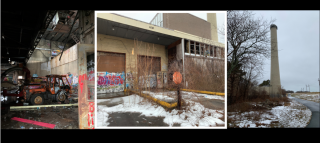Hedlund Announces Incinerator Demolition

Mayor Hedlund will submit a measure to the Weymouth Town Council to appropriate approximately $950,000 to fund the removal of the Wharf Street incinerator, a well overdue project that will address the environmental and safety hazards posed by the blighted 56-year old structure.
The Wharf Street incinerator has long been an environmental and public safety concern for the town. The project itself was extremely controversial when it was first proposed resulting in the attempted recall of DPW Board Members who supported the incinerator. Constructed in 1965, the incinerator was shut down about a decade later by the Environmental Protection Agency after the passage of the federal Clean Air Act because it did not comply with air pollution regulations. Because the new regulations rendered the site obsolete, it became an even bigger controversy after its closure in 1976 This was a mere 11 years after opening and well before the bonds for the $1.2M project were paid off, as it was not feasible to upgrade the facility to comply with the new standards.
After decommissioning, debates ensued as to the sites’ reuse plans. At different times throughout its history the incinerator has served as a trash transfer station, compost site, and landfill. In more recent years, under a previous administration, various industrial uses were proposed including a privately-operated trash transfer station and recycling facility. The state eventually intervened under a previous administration, formally ordering a remediation plan due to the disrepair, health threat, and decaying state of the building.
When Mayor Hedlund took office in 2016, remediating the site became a top priority.
“The incinerator site and landfill are directly on the banks of the Back River, an area of critical environmental concern (ACEC) to Metro Boston,” said Mayor Hedlund. “It was folly to have built this environmental intrusion where and when the Town did, and we cannot delay the remediation any longer.”
The Hedlund Administration immediately began taking steps to protect the land and enhance the osprey ecology, Back River Trail, and Great Esker Park. Using federal Land and Water Conservation Fund (LWCF) and local Community Preservation Act funding, the Hedlund Administration renovated the site and opened the Osprey Overlook Park in 2017. The approximate $1M expense to remove the hazardous incinerator was put on hold due to the challenges of financing the work and relocating the cell tower facilities located on the incinerator’s stack.
The Town has strategized for many years as to the best approach to remove the incinerator and how exactly to pay for the removal. As a result of years of stagnation and no viable use for the property, the incinerator has become both a health and safety hazard. The building often is subjected to vandalism and trespass and has asbestos and other health hazards like poisonous guano inside. Its presence at the Osprey Overlook Park is incongruous with the ecology of the park and Back River Trail posing a threat to the environment it is located in.
“The Back River Watershed Association has long supported Mayor Hedlund’s efforts to address the removal of the ‘Blighted, Hazardous, Incinerator’ building and stack at Wharf Street. Our Town must finally take responsibility and act to remediate this environmental hazardous site assaulted with decades of industrial misuse on the beautiful Weymouth Back River, an Area of Critical Environmental Concern,” said Linda DiAngleo, President of the Back River Watershed Association, Inc., in a statement.
“Back River Watershed Association Founder, Mary F. Toomey envisioned the opportunity to cleanup and cap this land as protected Open Space. Weymouth Back River is also designated a Local Scenic River, Wildlife Refuge, and one of Massachusetts’ Special Places, that all Citizens can take pride in through ecological preservation and stewardship. Back River Watershed Association appreciates this opportunity to work together for the success of this project,” President DiAngelo continued.
Initially the Town considered using revenue from the stack (tower) leases to pay for the incinerator removal. Unfortunately, this would mean that the stack would remain as the building came down. Now, with the funding available through the Host Community Agreement with Algonquin Gas Transmission, the Town can pay for the removal of the hazardous site and improve a long-overdue environmental and safety concern.
“While we fought the siting of the compressor station over the course of 5 years and through 22 lawsuits, being able to eliminate a blight and health hazard on the banks of the Back River through the Host Community Agreement is a small offset to the intrusive blight shoved down our throats on the Fore River,” said Mayor Hedlund.
The measure would appropriate approximately $940,000 to fund the removal of the incinerator and adjoining stack. A contractor would be selected through a competitive bid process and all work would be completed in compliance with DEP regulations. In addition to demolition, the site would be capped and remain unbuildable.
This would expand the Osprey Overlook park and provide for more open space in Town. In addition, the land would change from an industrial zone to protected conservation lands, preventing any future incongruous development. Finally, the Town would work with the cell company to find the best location to relocate the facilities on the stack. If the measure is approved by Council, demolition work would begin in the summer and see completion in the late fall.

